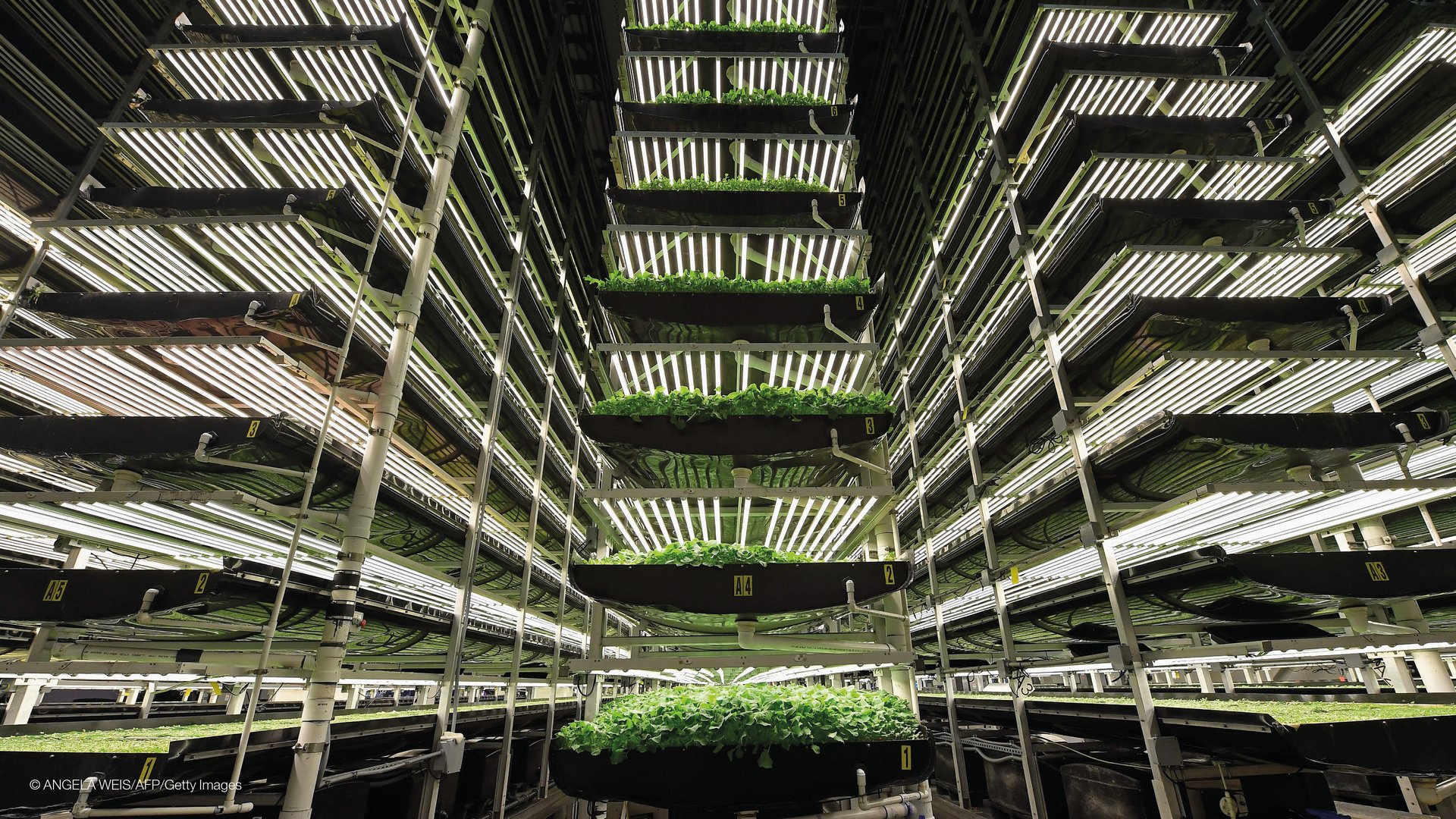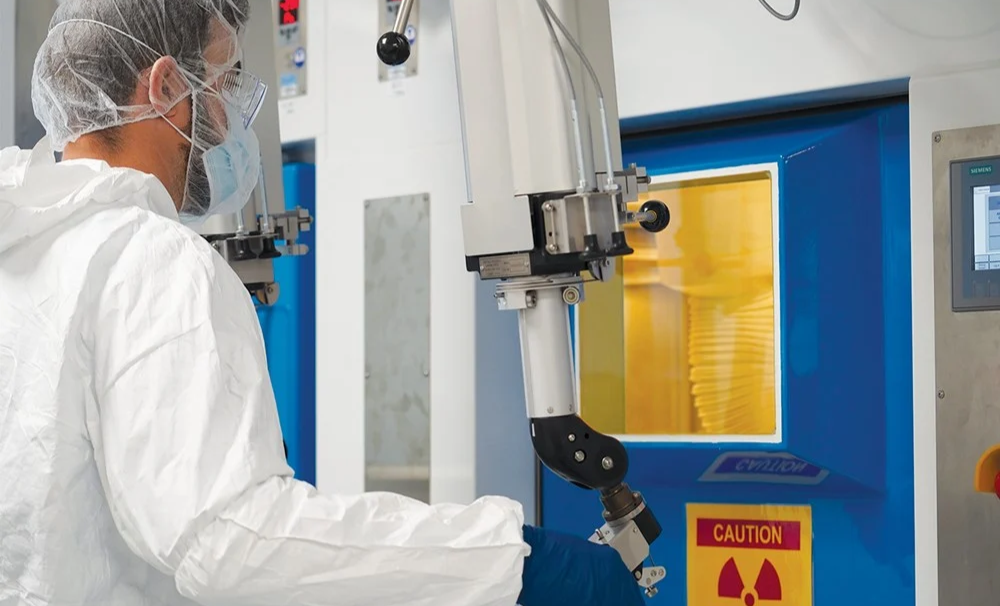Key points
This article is part of the Disruptive Innovation series.
- Food production is heading into a period of major disruption caused by innovative technologies and a need for more sustainable practices
- This is likely to include greater use of indoor vertical farms, plant-based alternatives to meat and milk, and ‘precision agriculture’, in which sensor-equipped machines are used to increase yields
- Investment opportunities include companies directly involved in food production as well as those enabling change

All investment strategies have the potential for profit and loss. Your or your clients’ capital may be at risk. Past performance is not a guide to future returns.
Human civilisation’s rise was closely bound to that of agriculture. The shift from hunter-gatherer societies to those in which animals and crops were farmed occurred about 11,000 years ago. It freed up time and resources, allowed towns and cities to be established, and made scientific discovery and commerce possible.
While farming and other types of food production have become more industrialised over the centuries, their development has occurred at a relatively slow pace, said investment manager Lee Qian at a recent Baillie Gifford event focused on disruptive innovations.
And when sudden changes have been attempted - for instance introducing genetically modified seeds - they have been met with resistance.
“Farmers operate on razor-thin margins, so they can’t afford to gamble on new technology that they’re unsure will work because one year’s bad crop can cause bankruptcy,” Qian explained.
“And consumers are careful about what they put in their mouths for good evolutionary reasons.”
WATCH: Baillie Gifford webinar on sustainable agriculture and food
But with forecasts of a further two billion mouths to feed by 2050, the status quo is unsustainable.
Agriculture already takes up 50 per cent of the world’s habitable land and up to 70 per cent of its freshwater supply.
It also accounts for about a quarter of greenhouse gas emissions.
And widespread use of antibiotics risks drug-resistant bacteria spreading among intensively farmed livestock that could then be transmitted to the humans who eat them and spread to the wider environment via the animals’ waste.
“The US livestock industry takes on average 100 calories of input to turn into just seven calories of edible protein,” added Qian.
“We must find ways to grow and produce food more efficiently.”
Meat alternatives
Thankfully several innovations are enabling just that.
Leading the charge is the rise of plant-based substitutes to meat and dairy. Baillie Gifford has invested in two pioneers:
- Beyond Meat - whose ever-growing range includes animal-free alternatives to meatballs, beefburgers, pork sausages and breaded chicken
- Oatly - which makes an oat-based drink that froths up when steamed to make cappuccinos and lattes that many people prefer to the milk-based originals
Vegetarian options have existed for years, but what’s new is an increased understanding of biology, including protein structures and the composition of fatty acids, Qian explained.
This allows new foods to be designed in the lab and then improved upon, similar to the way software is developed. Beyond Meat has highlighted this in its marketing, advertising its Beyond Burger 2.0 as an “even meatier” upgrade.
On the horizon, other companies are developing steaks and other meat cuts made from ‘cultured’ animal cells. This involves brewing proteins in bioreactor tanks to deliver the sensation of chewing into muscle and other body tissues, assuming future generations still have a taste for it.
“In 50 years’ time, the idea of cramming thousands of chickens or other animals into confined spaces and then eating their carcasses may feel really outdated,” said Qian.
“Alternatives are healthier and better for the environment.”
Engineered microbes
Change is coming to the way vegetables and other crops are grown too.
One approach focuses on biology, adding engineered microbes to seed coatings and soils. The aim is to provide protection against pests and disease as well as to reduce the need for fertilisers, whose production is a major source of carbon emissions.
‘Cell programming’ specialist Gingko Bioworks is one of those involved via its Joyn Bio joint venture with Bayer, as is the industrial microorganisms producer Novozymes.
“The microbes can fixate nitrogen from the air and supply it to the crops’ roots,” explained Qian.
“This provides a natural-based solution that can replace use of synthetic-derived chemical products.”
Precision farming
Another technique, called precision farming, involves the use of cameras, other sensors and software to make a farmer’s interventions more effective.
“As a tractor goes through the fields, computer vision can recognise in real-time the difference between a crop and a weed,” Qian gave as an example.
“The sprayer on the back then applies pesticides precisely on the weeds vastly reducing the amounts needed.”
Other examples of precision farming include:
- controlling irrigation systems to keep soil at the optimum moisture level
- automating the steering of tractors and harvesters. This can ensure fertilisers are evenly spread, vehicle wheels don’t crush crops or overly compact the soil, and fuel use is minimised
- analysing moisture to cut crops at the optimum length
- predicting and monitoring crop yields via imagery collected by drones
- using robot pickers to collect fruit and other produce when affordable human labour is not available
Baillie Gifford holding John Deere is one of the sector’s pioneers.
It invests more than $1.5bn a year in research and development, Qian said. It recently built on its lead by acquiring Bear Flag Robotics, a start-up that allows farmers to co-ordinate fleets of self-driving tractors via a smartphone app.
“It seems to be one of those rare examples where it’s the incumbent doing a lot of the innovation rather than being the one disrupted,” Qian noted.
John Deere’s capabilities are supported by several cloud-based technologies provided by Amazon’s AWS division and the private company Databricks, among others, illustrating how other firms enabling such innovation can also benefit.
Vertical farms
Indoor vertical farms promise further disruption.
Plants are grown in stacked layers rising as high as 18m off the ground.
Their operators control how much light, nutrients, oxygen, heat and other inputs are provided. In some cases the resulting crop is harvested and packaged by robotic systems, meaning it’s never touched by a human hand until being opened by the consumers.
The technology is being driven by advances in LED lighting, sensors and computer control systems. But it’s still relatively expensive, meaning early-stage practitioners have focused on high-value crops including pak choi, spinach and lettuce.
“It’s a less mature technology than precision farming,” said Qian.
“But the advantage is that you can locate them next to or even inside cities, in old abandoned factory space, for example.
“And that means you don’t have to transport food as far, which means a lower carbon footprint.”

Other advantages include:
- pesticides are rarely required as the sites are sealed off from outdoors. This means the crops can be sold as ‘organic’ and command a premium price
- there is less chance of crop failure and produce can be grown all year round
- they require much less water than traditional agriculture
Baillie Gifford has exposure to the sector via its stake in SoftBank, which has backed California-based Plenty Unlimited.
And although fund managers have yet to make direct investment of their own, Qian said there had been meetings with vertical farm start-ups. In addition, he added, Baillie Gifford has a relationship with the James Hutton Institute in Dundee, which has explored the technology among its other agricultural research projects.
Investment opportunities
Food production is being propelled forward by several forces of disruptive innovation, each with the potential to boost sustainability and profits.
And other investment opportunities are likely to arise that will suit long-term investors willing to back agri-tech companies that might take years to reach their potential.
“Being willing to be ambitious, think differently and be bold should differentiate us from the rest of the market,” said Qian.
“It’s about looking for companies where the technology can be validated, where there’s a strong management team with good culture, and they are going after a huge market opportunity.”
Everyone needs to eat and drink, so the potential gains for the companies that do end up at the forefront of future food production are huge.
Investors can benefit financially and support those solving some of the world’s most pressing problems with gusto.
WATCH: Baillie Gifford animation on disruptive innovation
About the Investment Manager
Lee Qian
Portfolio Manager
Lee joined Baillie Gifford in 2012 and is an investment manager and decision maker in the Positive Change Team. He is a CFA Charterholder and graduated BA (Hons) in Economics and Management from the University of Oxford in 2012.
Written by Leo Kelion
Assistant editor, Intellectual Capital
You can read our other articles on disruptive innovation via the links below.
Important information and risk factors
The views expressed in this recording are those of the speaker(s) and should not be considered as advice or a recommendation to buy, sell or hold a particular investment. They reflect personal opinion and should not be taken as statements of fact nor should any reliance be placed on them when making investment decisions.
This communication was produced and approved in October 2021 and has not been updated subsequently. It represents views held at the time of writing and may not reflect current thinking.
Some Baillie Gifford portfolios have a significant exposure to private companies. These assets may be more difficult to buy or sell, so changes in their prices may be greater.
Any stock examples mentioned are not intended to represent recommendations to buy or sell, neither is it implied that they will prove profitable in the future. It is not known whether they will feature in any future portfolio produced by us. Any individual examples will represent only a small part of the overall portfolio and are inserted purely to help illustrate our investment style.
This communication contains information on investments which does not constitute independent research. Accordingly, it is not subject to the protections afforded to independent research, but is classified as advertising under Art 68 of the Financial Services Act (‘FinSA’) and Baillie Gifford and its staff may have dealt in the investments concerned.
All information is sourced from Baillie Gifford & Co and is current unless otherwise stated.
The images used in this recording are for illustrative purposes only.
Baillie Gifford & Co and Baillie Gifford & Co Limited are authorised and regulated by the Financial Conduct Authority (FCA). Baillie Gifford & Co Limited is an Authorised Corporate Director of OEICs.
Baillie Gifford Overseas Limited provides investment management and advisory services to non-UK Professional/Institutional clients only. Baillie Gifford Overseas Limited is wholly owned by Baillie Gifford & Co. Baillie Gifford & Co and Baillie Gifford Overseas Limited are authorised and regulated by the FCA in the UK.
Persons resident or domiciled outside the UK should consult with their professional advisers as to whether they require any governmental or other consents in order to enable them to invest, and with their tax advisers for advice relevant to their own particular circumstances.
Financial intermediaries
This communication is suitable for use of financial intermediaries. Financial intermediaries are solely responsible for any further distribution and Baillie Gifford takes no responsibility for the reliance on this communication by any other person who did not receive this communication directly from Baillie Gifford.
Europe
Baillie Gifford Investment Management (Europe) Limited provides investment management and advisory services to European (excluding UK) clients. It was incorporated in Ireland in May 2018 and is authorised by the Central Bank of Ireland. Through its MiFID passport, it has established Baillie Gifford Investment Management (Europe) Limited (Frankfurt Branch) to market its investment management and advisory services and distribute Baillie Gifford Worldwide Funds plc in Germany. Similarly, it has established Baillie Gifford Investment Management (Europe) Limited (Amsterdam Branch) to market its investment management and advisory services and distribute Baillie Gifford Worldwide Funds plc in The Netherlands. Baillie Gifford Investment Management (Europe) Limited also has a representative office in Zurich, Switzerland pursuant to Art. 58 of the Federal Act on Financial Institutions ("FinIA"). It does not constitute a branch and therefore does not have authority to commit Baillie Gifford Investment Management (Europe) Limited. It is the intention to ask for the authorisation by the Swiss Financial Market Supervisory Authority (FINMA) to maintain this representative office of a foreign asset manager of collective assets in Switzerland pursuant to the applicable transitional provisions of FinIA. Baillie Gifford Investment Management (Europe) Limited is a wholly owned subsidiary of Baillie Gifford Overseas Limited, which is wholly owned by Baillie Gifford & Co.
China
Baillie Gifford Investment Management (Shanghai) Limited 柏基投资管理(上海)有限公司(‘BGIMS’) is wholly owned by Baillie Gifford Overseas Limited and may provide investment research to the Baillie Gifford Group pursuant to applicable laws. BGIMS is incorporated in Shanghai in the People’s Republic of China (‘PRC’) as a wholly foreign-owned limited liability company with a unified social credit code of 91310000MA1FL6KQ30. BGIMS is a registered Private Fund Manager with the Asset Management Association of China (‘AMAC’) and manages private security investment fund in the PRC, with a registration code of P1071226.
Baillie Gifford Overseas Investment Fund Management (Shanghai) Limited
柏基海外投资基金管理(上海)有限公司(‘BGQS’) is a wholly owned subsidiary of BGIMS incorporated in Shanghai as a limited liability company with its unified social credit code of 91310000MA1FL7JFXQ. BGQS is a registered Private Fund Manager with AMAC with a registration code of P1071708. BGQS has been approved by Shanghai Municipal Financial Regulatory Bureau for the Qualified Domestic Limited Partners (QDLP) Pilot Program, under which it may raise funds from PRC investors for making overseas investments.
Hong Kong
Baillie Gifford Asia (Hong Kong) Limited 柏基亞洲(香港)有限公司 is wholly owned by Baillie Gifford Overseas Limited and holds a Type 1 and a Type 2 license from the Securities & Futures Commission of Hong Kong to market and distribute Baillie Gifford’s range of collective investment schemes to professional investors in Hong Kong. Baillie Gifford Asia (Hong Kong) Limited
柏基亞洲(香港)有限公司 can be contacted at Suites 2713-2715, Two International Finance Centre, 8 Finance Street, Central, Hong Kong. Telephone +852 3756 5700.
South Korea
Baillie Gifford Overseas Limited is licensed with the Financial Services Commission in South Korea as a cross border Discretionary Investment Manager and Non-discretionary Investment Adviser.
Japan
Mitsubishi UFJ Baillie Gifford Asset Management Limited (‘MUBGAM’) is a joint venture company between Mitsubishi UFJ Trust & Banking Corporation and Baillie Gifford Overseas Limited. MUBGAM is authorised and regulated by the Financial Conduct Authority.
Australia
Baillie Gifford Overseas Limited (ARBN 118 567 178) is registered as a foreign company under the Corporations Act 2001 (Cth) and holds Foreign Australian Financial Services Licence No 528911. This material is provided to you on the basis that you are a “wholesale client” within the meaning of section 761G of the Corporations Act 2001 (Cth) (“Corporations Act”). Please advise Baillie Gifford Overseas Limited immediately if you are not a wholesale client. In no circumstances may this material be made available to a “retail client” within the meaning of section 761G of the Corporations Act.
This material contains general information only. It does not take into account any person’s objectives, financial situation or needs.
South Africa
Baillie Gifford Overseas Limited is registered as a Foreign Financial Services Provider with the Financial Sector Conduct Authority in South Africa.
North America
Baillie Gifford International LLC is wholly owned by Baillie Gifford Overseas Limited; it was formed in Delaware in 2005 and is registered with the SEC. It is the legal entity through which Baillie Gifford Overseas Limited provides client service and marketing functions in North America. Baillie Gifford Overseas Limited is registered with the SEC in the United States of America.
The Manager is not resident in Canada, its head office and principal place of business is in Edinburgh, Scotland. Baillie Gifford Overseas Limited is regulated in Canada as a portfolio manager and exempt market dealer with the Ontario Securities Commission ('OSC'). Its portfolio manager licence is currently passported into Alberta, Quebec, Saskatchewan, Manitoba and Newfoundland & Labrador whereas the exempt market dealer licence is passported across all Canadian provinces and territories. Baillie Gifford International LLC is regulated by the OSC as an exempt market and its licence is passported across all Canadian provinces and territories. Baillie Gifford Investment Management (Europe) Limited (‘BGE’) relies on the International Investment Fund Manager Exemption in the provinces of Ontario and Quebec.
Oman
Baillie Gifford Overseas Limited (“BGO”) neither has a registered business presence nor a representative office in Oman and does not undertake banking business or provide financial services in Oman. Consequently, BGO is not regulated by either the Central Bank of Oman or Oman’s Capital Market Authority. No authorization, licence or approval has been received from the Capital Market Authority of Oman or any other regulatory authority in Oman, to provide such advice or service within Oman. BGO does not solicit business in Oman and does not market, offer, sell or distribute any financial or investment products or services in Oman and no subscription to any securities, products or financial services may or will be consummated within Oman. The recipient of this material represents that it is a financial institution or a sophisticated investor (as described in Article 139 of the Executive Regulations of the Capital Market Law) and that its officers/employees have such experience in business and financial matters that they are capable of evaluating the merits and risks of investments.
Qatar
The materials contained herein are not intended to constitute an offer or provision of investment management, investment and advisory services or other financial services under the laws of Qatar. The services have not been and will not be authorised by the Qatar Financial Markets Authority, the Qatar Financial Centre Regulatory Authority or the Qatar Central Bank in accordance with their regulations or any other regulations in Qatar.
Israel
Baillie Gifford Overseas is not licensed under Israel’s Regulation of Investment Advising, Investment Marketing and Portfolio Management Law, 5755-1995 (the Advice Law) and does not carry insurance pursuant to the Advice Law. This material is only intended for those categories of Israeli residents who are qualified clients listed on the First Addendum to the Advice Law.
Ref: 12331 10004078






